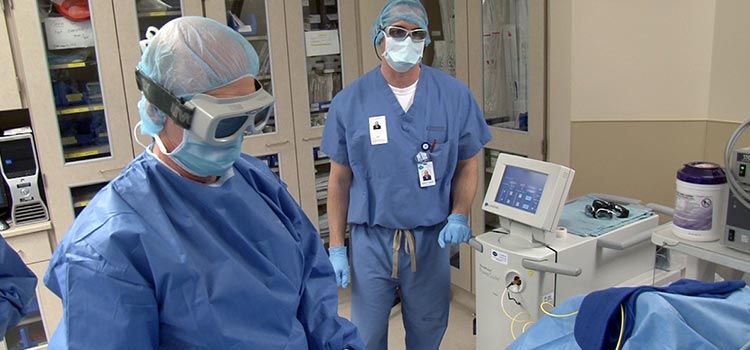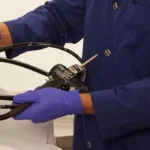As the use of medical laser technology continues to increase, so do the risks and safety concerns associated with surgical lasers. Establishing a dedicated MLSO is critical for your OR.
The Evolving Frontier of Medical Laser Safety
Year after year, cutting-edge advancements in laser technology push the boundaries of what’s possible in the OR. From enabling physicians to perform a more diverse range of procedures quicker, to cutting down on lengthy patient hospital stays, new surgical and laser technology is one of the easier ways for hospitals to realize improved revenue and attract more patients.
The challenge is, the advancement of surgical technology has come with a parallel rise in risk, patient incidents, and litigation. So much so that it continues to draw attention from the highest federal regulatory bodies. Initially, hospitals responded to these challenges by putting in place recommended structures – such as Laser Safety Committees, Laser Safety Program Policy and Procedure Documents, Equipment Cleaning Processes, and Equipment Maintenance and Testing Processes. However, one of the most pressing needs within facilities relates to the following compliance notice:
To be compliant with the American National Standards Institute (ANSI) Z136.3 Standard for “Safe Use of Lasers in Health Care,” every facility that uses a medical or aesthetic laser must establish a formal Laser Safety Program that is documented and managed by an appointed Laser Safety Officer (LSO). The standard applies to all patient care cases in which a laser is used, regardless of whether the laser system is owned, borrowed, or rented. That is to say, a medical laser vendor does not act as the health care facility’s MLSO simply because the vendor takes on the responsibility of creating a laser-safe environment during a specific case. The facility must still establish a laser safety program, designated MLSO, and other responsibilities associated with medical laser usage.
Without a designated MLSO, the facility, laser operator, laser user, and patient are exposed to a number of risks, including:
- Administrative and regulatory penalties
- Lawsuits and litigation
- Loss of credentialing
- Injury to patients and staff
- Damage to credibility and reputation
Why a Dedicated Medical Laser Safety Officer is Important
Having a dedicated medical laser safety officer with proper training and experience to monitor and oversee the control of laser hazards can mitigate or entirely avoid these issues, potentially preventing tens of thousands, if not millions, of dollars in damages.
One example of the importance of having a dedicated MLSO relates to a recent update to the AORN guidelines addressing the circumstances in which a dedicated laser operator is required. The new “Energy-Generating Devices” section of the 2017 and 2018 AORN Guidelines for Perioperative Practice states that a laser operator is to have no competing responsibilities in the operating room and should have their sole focus be on the laser during a case.
This new section of the AORN guidelines means any Surgical Laser Program that utilizes a staff member with other competing responsibilities to operate the controls of a laser is out of compliance in many circumstances with the AORN Guidelines, and therefore subject to the risk of legal implications. And while the AORN and ANSI are recommended standards and guidelines, rather than actual law, they are enforced as such by agencies such as the Joint Commission and the Occupational Safety and Health Administration (OSHA). Compliance in this area is critical.
In fact, in one case in 2013, a patient was awarded $30 million for an event that would have been completely avoidable had certain precautions been implemented. The outcome of this litigation is not to say all cases will result in such high damages, but it does illustrate the potential risks that facilities and clinicians face if their laser safety program is not up to standards.
MLSO Training Opportunities
Designating an MLSO requires that person to obtain the appropriate education and training to be able to effectively administer the laser safety program and become certified by the Board of Laser Safety. The Laser Institute of America (LIA) offers an official, yet easily accessible course for MLSO training.
The LIA MLSO training course, in partnership with UHS, is intended to build a foundation for establishing a safe and effective laser safety program by focusing on:
- Laser physics
- Laser applications
- Biophysics
- Laser safety and best practices
Proper medical laser safety training is critical as laser standards and health care laser systems are rapidly changing and becoming increasingly more complex, making it very difficult for hospital staff to stay up to date. As a result, the LIA MLSO training provides much-needed credibility, expertise, and knowledge – assets necessary to ensure safety for facilities, staff, and patients.
For more information on the LIA MLSO training course, please view the video below.
Want to learn more? Watch our other Medical Laser Safety Officer training videos and explore our Resource Center.

Richard Gama, CST/CMLSO, serves as the Director of Clinical Services & Training for Agiliti. Richard brings over twelve years of continuous MLSO certification and has been trained and working as a laser safety officer since 1991. Connect with Richard on Linkedin here.










